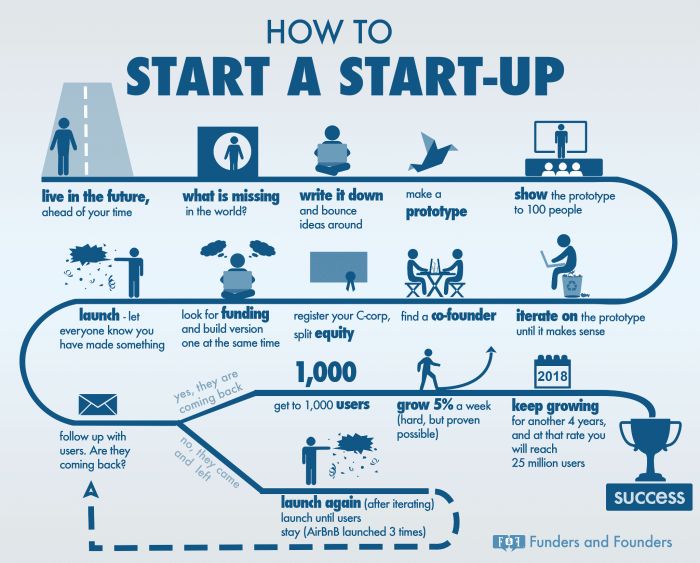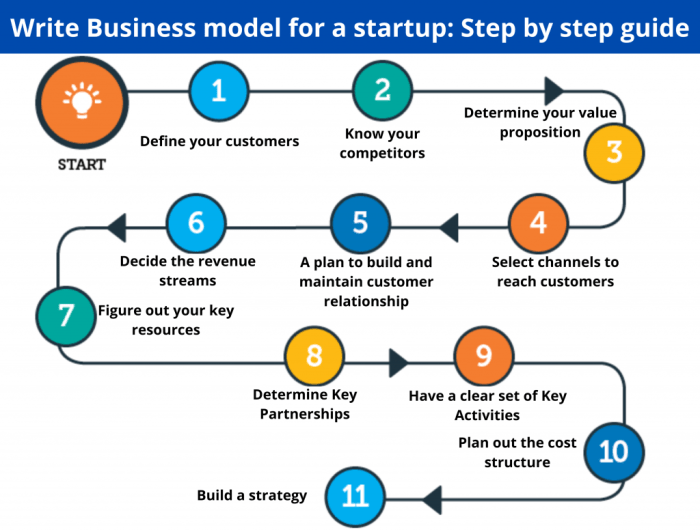Building a Startup Business dives into the world of entrepreneurship, offering insights on how to turn your innovative idea into a thriving business venture. Get ready to embark on an exciting journey filled with challenges and triumphs in the fast-paced startup landscape.
Learn about the crucial steps involved in building a strong team, developing innovative products, creating effective marketing strategies, and managing finances to ensure the success of your startup.
Importance of Startups

Startups are the lifeblood of today’s economy, driving innovation and shaking up traditional industries. These small businesses are essential for creating job opportunities and pushing the boundaries of what is possible in various sectors.
Driving Innovation
Startups are known for their disruptive nature, challenging the status quo and introducing new ideas and technologies. Companies like Uber and Airbnb have revolutionized transportation and hospitality, showing how startups can change the way we live and work.
Creating Job Opportunities
Startups are major job creators, offering employment opportunities to individuals with diverse skills and backgrounds. By hiring local talent and fostering a culture of creativity and collaboration, startups play a crucial role in reducing unemployment rates and boosting economic growth.
Examples of Successful Startups
Some of the most successful startups, such as Google, Facebook, and Amazon, have transformed entire industries and become household names around the world. These companies started small but quickly grew into global giants, showing the immense impact startups can have on the economy and society as a whole.
Initial Steps for Building a Startup
Starting a new business involves several key steps that are crucial for success. One of the first steps is conducting thorough market research and validating your business idea to ensure there is a demand for your product or service. This step is essential in understanding your target audience, identifying competitors, and determining the viability of your business concept.
Importance of Market Research and Idea Validation
Market research helps you gather valuable insights about your industry, target market, and competitors. It allows you to make informed decisions based on data rather than assumptions. Idea validation, on the other hand, involves testing your business idea with potential customers to see if there is genuine interest and demand for your offering. By validating your idea early on, you can avoid wasting time and resources on a product or service that may not succeed in the market.
- Conduct surveys, interviews, and focus groups to gather feedback from potential customers.
- Analyze industry trends, market size, and competitor strategies to identify opportunities and threats.
- Use online tools and platforms to gather data and insights that can help you make informed decisions.
- Iterate on your business idea based on feedback and validation results to refine your offering.
Creating a Business Plan and Securing Funding
Once you have validated your business idea, the next step is to create a comprehensive business plan that Artikels your goals, target market, marketing strategy, financial projections, and more. A well-crafted business plan not only serves as a roadmap for your startup but also helps you attract investors and lenders to secure funding for your venture.
- Include an executive summary, company description, market analysis, organizational structure, and financial projections in your business plan.
- Identify sources of funding such as bootstrapping, angel investors, venture capital, or small business loans.
- Pitch your business idea to potential investors and lenders using your business plan to demonstrate the potential for growth and profitability.
- Seek guidance from mentors, advisors, or accelerators to refine your business plan and pitch presentation for better chances of securing funding.
Building a Strong Team
Building a strong team is crucial for the success of a startup. A talented and diverse team brings a variety of perspectives, skills, and experiences to the table, leading to innovative ideas and creative problem-solving.
Importance of Assembling a Talented and Diverse Team
Assembling a talented and diverse team is essential for a startup as it brings together individuals with different skill sets and backgrounds. This diversity fosters creativity, leading to unique solutions to challenges that the startup may face. Additionally, a talented team ensures that the startup has the necessary expertise to execute its vision and achieve its goals.
Strategies for Recruiting the Right Individuals for a Startup
- Define the roles and responsibilities clearly to attract candidates who align with the startup’s vision.
- Utilize networking and referrals to reach out to potential candidates who may not be actively seeking new opportunities.
- Look for candidates who not only possess the required skills but also fit well with the company culture and values.
- Consider conducting group interviews or team assessments to evaluate how candidates collaborate and communicate with others.
Team Dynamics and Collaboration in Startup Success
Effective team dynamics and collaboration are key to the success of a startup. When team members work well together, they can leverage each other’s strengths, leading to increased productivity and efficiency. Communication and trust among team members foster a positive work environment where ideas can flow freely, and challenges can be addressed collectively. Ultimately, a cohesive team that collaborates effectively is better equipped to navigate the ups and downs of building a startup.
Product Development and Innovation
When building a startup, one of the crucial aspects is the development of a unique product or service that meets the needs of the target market. Innovation plays a key role in not only creating a competitive edge but also in ensuring long-term success in the industry.
Importance of Product Development
Product development is the process of conceptualizing, designing, and creating a new product or service to be offered to customers. It involves market research, identifying customer needs, prototyping, testing, and refining the product before launching it in the market.
- Understanding the market demand and customer preferences is essential for developing a product that resonates with the target audience.
- Continuous iteration and improvement based on feedback help in enhancing the product to meet changing market trends and customer expectations.
- Effective product development can lead to higher customer satisfaction, increased sales, and brand loyalty.
Significance of Innovation in Startups
Innovation is the driving force behind the success of many startups. It involves thinking creatively, taking risks, and implementing new ideas to develop groundbreaking products or services that disrupt the market.
- Staying innovative allows startups to differentiate themselves from competitors and attract a loyal customer base.
- Innovation leads to increased efficiency, productivity, and profitability, enabling startups to scale and grow rapidly.
- Embracing innovation fosters a culture of creativity and experimentation within the startup team, encouraging out-of-the-box thinking.
Examples of Innovative Startups
Several successful startups have revolutionized their industries through innovative products or services. Here are a few examples:
“Uber disrupted the transportation industry by introducing a convenient and cost-effective ride-sharing service through a mobile app.”
“Airbnb transformed the hospitality sector by allowing individuals to rent out their homes to travelers, providing a unique and personalized accommodation experience.”
“Tesla revolutionized the automotive industry by developing electric vehicles with cutting-edge technology and sustainable energy solutions.”
Marketing and Branding Strategies: Building A Startup Business

In the competitive landscape of startups, effective marketing and branding strategies are crucial for establishing a strong presence and attracting customers. Let’s dive into how startups can leverage these strategies to build their identity and reach a wider audience.
Creating Effective Marketing Strategies, Building a Startup Business
Effective marketing strategies for startups involve understanding the target market, identifying key differentiators, and leveraging various channels to reach potential customers. Some key tactics include:
- Utilizing social media platforms to engage with the audience and showcase the brand’s personality.
- Implementing strategies to improve online visibility and drive organic traffic to the website.
- Collaborating with influencers or industry experts to increase brand awareness and credibility.
- Running targeted advertising campaigns to reach specific demographics and maximize ROI.
Role of Branding in Building a Startup’s Identity
Branding plays a pivotal role in shaping how a startup is perceived by the target audience. It involves creating a unique identity, including the brand’s name, logo, colors, and messaging. Effective branding can:
- Establish trust and credibility with customers.
- Differentiate the startup from competitors in the market.
- Create an emotional connection with the audience, leading to brand loyalty.
- Help in building a consistent brand image across all touchpoints.
Digital Marketing for Wider Audience Reach
Digital marketing offers startups a cost-effective way to reach a wider audience and drive engagement. By leveraging digital channels such as social media, email marketing, and content marketing, startups can:
- Target specific audience segments based on demographics, interests, and behaviors.
- Track and analyze campaign performance in real-time to make data-driven decisions.
- Personalize marketing efforts to deliver relevant content to individual users.
- Expand reach beyond local boundaries and tap into global markets.
Financial Management for Startups
Starting a business requires more than just a great idea – it also requires careful financial planning and management. Without a solid financial foundation, even the most innovative startup can struggle to stay afloat. Let’s delve into the importance of financial planning, strategies for managing cash flow, securing investments, and balancing financial growth with sustainable practices.
Importance of Financial Planning and Budgeting
Financial planning is crucial for startups to set clear goals, track progress, and make informed decisions. Creating a budget helps allocate resources effectively, prioritize spending, and avoid unnecessary expenses. It provides a roadmap for financial success and helps in identifying potential risks or opportunities for growth.
Strategies for Managing Cash Flow and Securing Investments
Cash flow management is essential for startups to ensure there is enough money coming in to cover expenses and sustain operations. Strategies may include monitoring cash flow regularly, negotiating favorable payment terms with suppliers, and incentivizing early payments from customers. Securing investments can involve pitching to investors, preparing a solid business plan, and demonstrating the potential for high returns.
Balancing Financial Growth with Sustainable Practices
While financial growth is important for startups, it should not come at the expense of sustainability. Balancing growth with sustainable practices involves prioritizing long-term success over short-term gains. This can include investing in eco-friendly solutions, fostering a positive company culture, and maintaining transparency in financial dealings. By focusing on sustainability, startups can build a strong foundation for lasting success.





